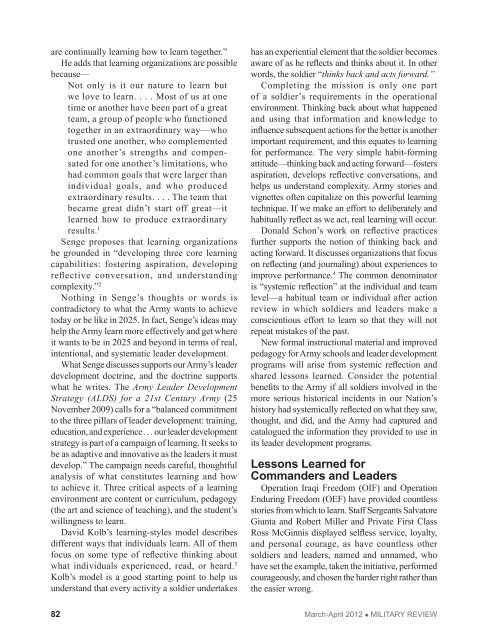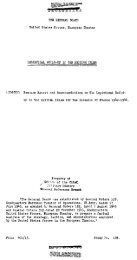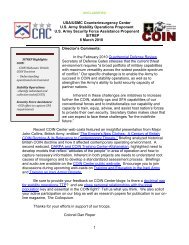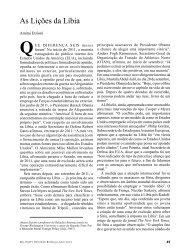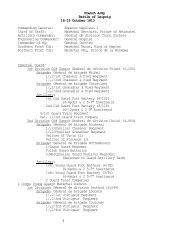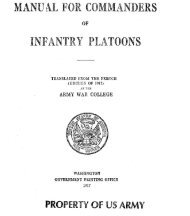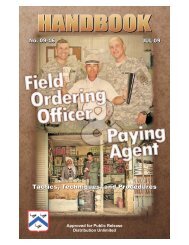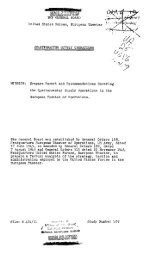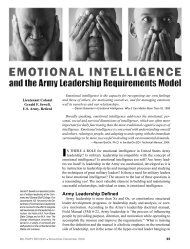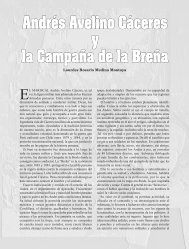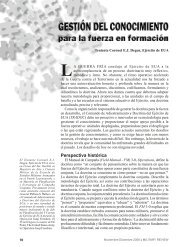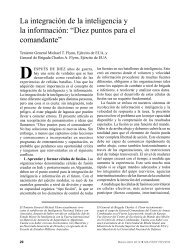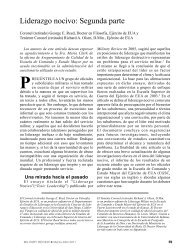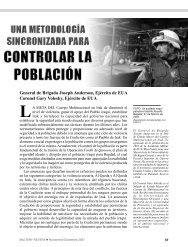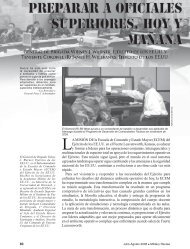Joe Doty - US Army Combined Arms Center and Fort Leavenworth
Joe Doty - US Army Combined Arms Center and Fort Leavenworth
Joe Doty - US Army Combined Arms Center and Fort Leavenworth
You also want an ePaper? Increase the reach of your titles
YUMPU automatically turns print PDFs into web optimized ePapers that Google loves.
are continually learning how to learn together.”<br />
He adds that learning organizations are possible<br />
because—<br />
Not only is it our nature to learn but<br />
we love to learn. . . . Most of us at one<br />
time or another have been part of a great<br />
team, a group of people who functioned<br />
together in an extraordinary way—who<br />
trusted one another, who complemented<br />
one another’s strengths <strong>and</strong> compensated<br />
for one another’s limitations, who<br />
had common goals that were larger than<br />
individual goals, <strong>and</strong> who produced<br />
extraordinary results. . . . The team that<br />
became great didn’t start off great—it<br />
learned how to produce extraordinary<br />
results. 1<br />
Senge proposes that learning organizations<br />
be grounded in “developing three core learning<br />
capabilities: fostering aspiration, developing<br />
reflective conversation, <strong>and</strong> underst<strong>and</strong>ing<br />
complexity.” 2<br />
Nothing in Senge’s thoughts or words is<br />
contradictory to what the <strong>Army</strong> wants to achieve<br />
today or be like in 2025. In fact, Senge’s ideas may<br />
help the <strong>Army</strong> learn more effectively <strong>and</strong> get where<br />
it wants to be in 2025 <strong>and</strong> beyond in terms of real,<br />
intentional, <strong>and</strong> systematic leader development.<br />
What Senge discusses supports our <strong>Army</strong>’s leader<br />
development doctrine, <strong>and</strong> the doctrine supports<br />
what he writes. The <strong>Army</strong> Leader Development<br />
Strategy (ALDS) for a 21st Century <strong>Army</strong> (25<br />
November 2009) calls for a “balanced commitment<br />
to the three pillars of leader development: training,<br />
education, <strong>and</strong> experience . . . our leader development<br />
strategy is part of a campaign of learning. It seeks to<br />
be as adaptive <strong>and</strong> innovative as the leaders it must<br />
develop.” The campaign needs careful, thoughtful<br />
analysis of what constitutes learning <strong>and</strong> how<br />
to achieve it. Three critical aspects of a learning<br />
environment are content or curriculum, pedagogy<br />
(the art <strong>and</strong> science of teaching), <strong>and</strong> the student’s<br />
willingness to learn.<br />
David Kolb’s learning-styles model describes<br />
different ways that individuals learn. All of them<br />
focus on some type of reflective thinking about<br />
what individuals experienced, read, or heard. 3<br />
Kolb’s model is a good starting point to help us<br />
underst<strong>and</strong> that every activity a soldier undertakes<br />
has an experiential element that the soldier becomes<br />
aware of as he reflects <strong>and</strong> thinks about it. In other<br />
words, the soldier “thinks back <strong>and</strong> acts forward.”<br />
Completing the mission is only one part<br />
of a soldier’s requirements in the operational<br />
environment. Thinking back about what happened<br />
<strong>and</strong> using that information <strong>and</strong> knowledge to<br />
influence subsequent actions for the better is another<br />
important requirement, <strong>and</strong> this equates to learning<br />
for performance. The very simple habit-forming<br />
attitude—thinking back <strong>and</strong> acting forward—fosters<br />
aspiration, develops reflective conversations, <strong>and</strong><br />
helps us underst<strong>and</strong> complexity. <strong>Army</strong> stories <strong>and</strong><br />
vignettes often capitalize on this powerful learning<br />
technique. If we make an effort to deliberately <strong>and</strong><br />
habitually reflect as we act, real learning will occur.<br />
Donald Schon’s work on reflective practices<br />
further supports the notion of thinking back <strong>and</strong><br />
acting forward. It discusses organizations that focus<br />
on reflecting (<strong>and</strong> journaling) about experiences to<br />
improve performance. 4 The common denominator<br />
is “systemic reflection” at the individual <strong>and</strong> team<br />
level—a habitual team or individual after action<br />
review in which soldiers <strong>and</strong> leaders make a<br />
conscientious effort to learn so that they will not<br />
repeat mistakes of the past.<br />
New formal instructional material <strong>and</strong> improved<br />
pedagogy for <strong>Army</strong> schools <strong>and</strong> leader development<br />
programs will arise from systemic reflection <strong>and</strong><br />
shared lessons learned. Consider the potential<br />
benefits to the <strong>Army</strong> if all soldiers involved in the<br />
more serious historical incidents in our Nation’s<br />
history had systemically reflected on what they saw,<br />
thought, <strong>and</strong> did, <strong>and</strong> the <strong>Army</strong> had captured <strong>and</strong><br />
catalogued the information they provided to use in<br />
its leader development programs.<br />
Lessons Learned for<br />
Comm<strong>and</strong>ers <strong>and</strong> Leaders<br />
Operation Iraqi Freedom (OIF) <strong>and</strong> Operation<br />
Enduring Freedom (OEF) have provided countless<br />
stories from which to learn. Staff Sergeants Salvatore<br />
Giunta <strong>and</strong> Robert Miller <strong>and</strong> Private First Class<br />
Ross McGinnis displayed selfless service, loyalty,<br />
<strong>and</strong> personal courage, as have countless other<br />
soldiers <strong>and</strong> leaders, named <strong>and</strong> unnamed, who<br />
have set the example, taken the initiative, performed<br />
courageously, <strong>and</strong> chosen the harder right rather than<br />
the easier wrong.<br />
82 March-April 2012 • MILITARY REVIEW


